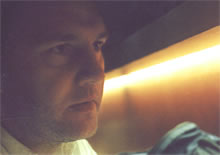
Is there a connection between this and that other feature?
No, what happened was I screened the short and the producer of this job now picked it up and saw it and offered me this job. The connection was that they saw it and liked it and then came to do this for them.
Tell me about this feature - what's it about?
It's called Sweet Revenge and it's about a history professor who takes his students out around London, he's very charismatic. He also as a side-line of organising revenges for people. When they want revenge he organises it. It works out that he kind of gets close and falls in love with this woman and his life goes hay-wire. It' s a thriller.
Where did the idea come from?
I didn't write it. They came to me with it. The girl who wrote it is called Sandy Walsh and she'd had this idea for a long time and wrote it. It's an original story by her.
Tell me something about these revenges. How do they find out about the guy?
It's a very selective technique that they have to go through. They have a thing where they just get introduced to him because he finds them rather than they find him.
How did you shoot two one-hour episodes. Did you shoot it as a feature?
We shot it in 30 days. That's what you get.
So how does that feel?
It's great, it's mad. You just, you don't have time for anything, you just go for it and do it. I mean the producer has the budget and as soon as I got told it I forgot it, for me you just do it day by day.
That sounds quite peculiar,
I do know the budget. It's very well organised - a lot more organised than an indie but for me, I've always thought it was the producer's problem rather than the director's problem. My job is just to get as much as I can out of the budget. I mean if I know the budget. I find it limits me so I just carry on with what I'm doing. They make it work for me and then every now and again they just say, 'you absolutely can't have that.' But it's works really. If I think about the budget too much it restricts me so I just get on with it the job really.
That now sound ideal.
I raised all the money from my shorts but I completely forgot about the money. I gave it to someone else and I told them I wanted this and that and they budgeted my money. So if I raise £25,000 for a short and I want a horse then I get a horse. It's their problem to buy me a horse at the price that they can get it. I really don't worry about it.
For me it's all about your price is your price and your budget is your budget and you just get on with it. There are other ideas where you think about the expensive things in the world - it actually turns out to be really cheap. The real expense is in post-production. Those are the sorts of things you need on a favour basis and they are the things that will make or break you.

How did you hear of the part of Weber in Captain Corelli?
I had to go through a huge interview process for it.
Had you read the book?
Yeah I'd read the book and I liked it a lot actually but not the end so much. I loved Weber's character though and I enjoyed playing him.
How's it feel to read a character and then find yourself playing him down the line? Does it affect your decision to play him?
No you never know that because you've got nothing else to go on. You read the script and if you like it you take to it. It's like any job in that you never know what it's going to be like but that's part of your responsibility. You have to forget about the book straight away and get into the medium you'll be working in.
Did you like the finished product?
I love the film actually, I'm a big fan.
How did you hear about the Highgate film festival?
From Nicola Hollinshead who I've known for a long time, from the Everyman. She's got a great industry panel together with people like Robin Gutch of Film Four and Robert Jones from the Film Council, I'm looking forward to it.
Good luck in post David.
Thanks.